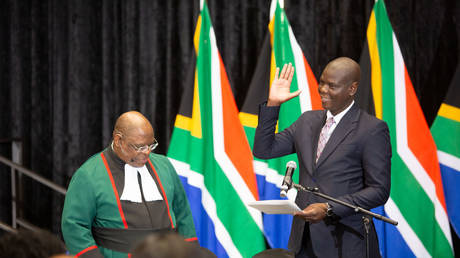ARTICLE AD BOX
Olaf Scholz should seek a truce now and settle terms later, Aleksandar Vucic has said
The West needs to negotiate a ceasefire in Ukraine on any terms and as soon as possible, Serbian President Aleksandar Vucic has said.
He spoke to the German outlet Handelsblatt ahead of Chancellor Olaf Scholz’s visit to Belgrade, which is expected to revolve around controversial plans for a lithium mine in western Serbia.
“The situation in Ukraine will only get worse,” Vucic told the outlet. “If Scholz really wanted to hear what I think, I would tell him: Make a ceasefire deal as soon as you can, no matter what the terms. You can discuss the terms later.”
Vucic briefly spoke with Scholz on Thursday at the European Political Community summit in the UK. The Serbian president described the atmosphere at the event as “a NATO+ meeting where everyone kept saying Ukraine must win.”
“No one was saying how to solve the problem with dialogue,” Vucic told Serbian media after the meeting. “It was all just ‘Ukraine must win, Russia must be defeated,’ and that’s it.”
Read more Ukraine conflict can’t be resolved without Russia – South African FM
Ukraine conflict can’t be resolved without Russia – South African FM
The Serbian president said he would try to argue for a “more rational approach” and the importance of peace, but that such a position would probably not be met with understanding.
Vucic has resisted EU pressure to join the bloc’s sanctions against Russia and declared Serbia’s neutrality in the conflict.
An attempt to establish a ceasefire in Ukraine was made last week by Hungarian Prime Minister Viktor Orban, following his “peace tour” of Kiev, Moscow, Beijing and Washington. Ukraine, the US and the EU rejected Orban’s proposal, however.
On Tuesday, European Council President Charles Michel told Orban he had “no European Council mandate to engage on behalf of the Union” on the international stage. Michel also insisted that “no discussion about Ukraine can take place without Ukraine,” and claimed that Brussels was committed to Vladimir Zelensky’s so-called peace formula, which de facto demands Russia’s surrender.
Moscow has rejected the document as ludicrous and presented its own set of terms, starting with Kiev’s recognition of territorial changes on the ground and a binding commitment not to join NATO.
.png)
 4 months ago
2
4 months ago
2








 English (US)
English (US)